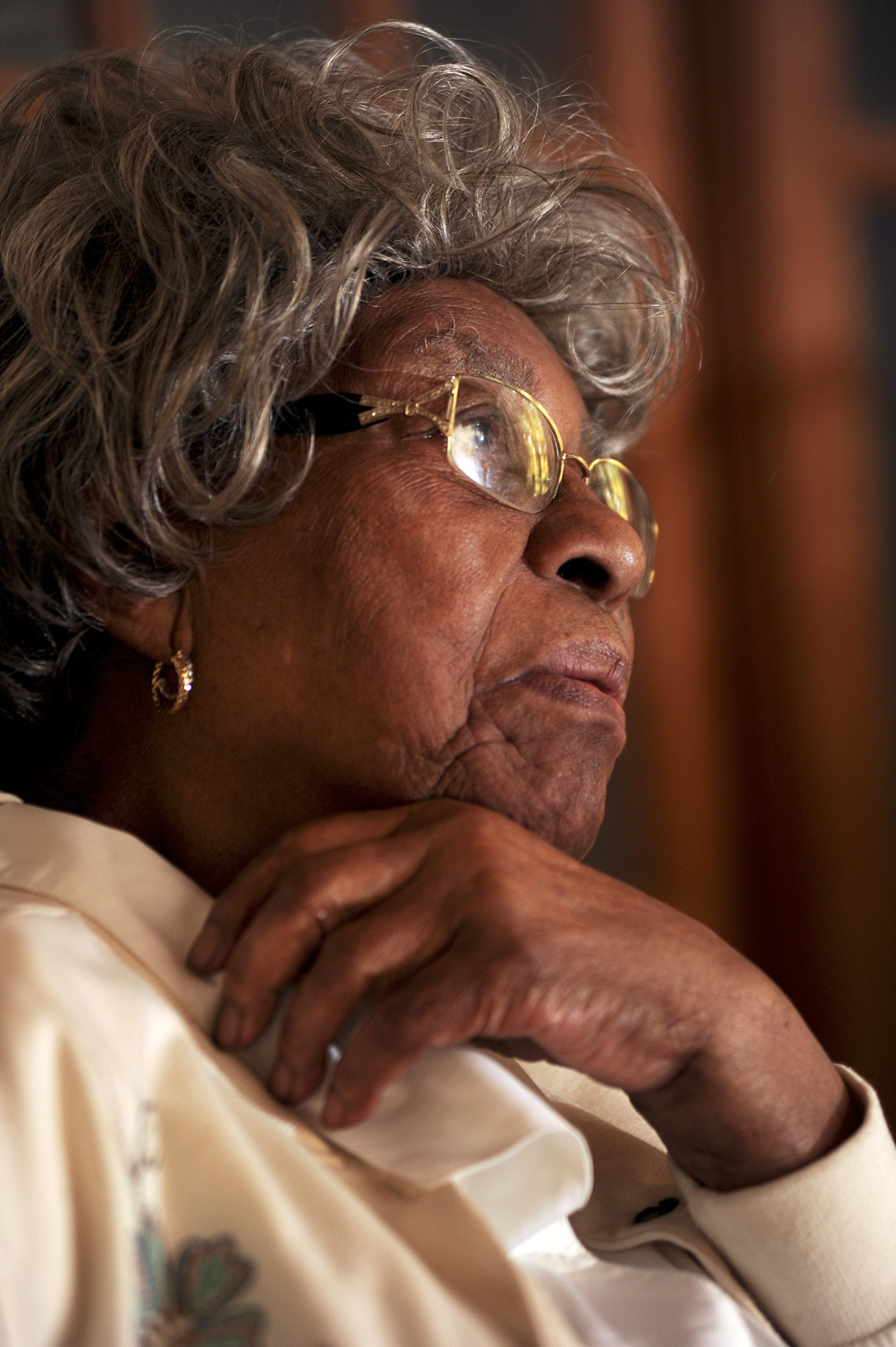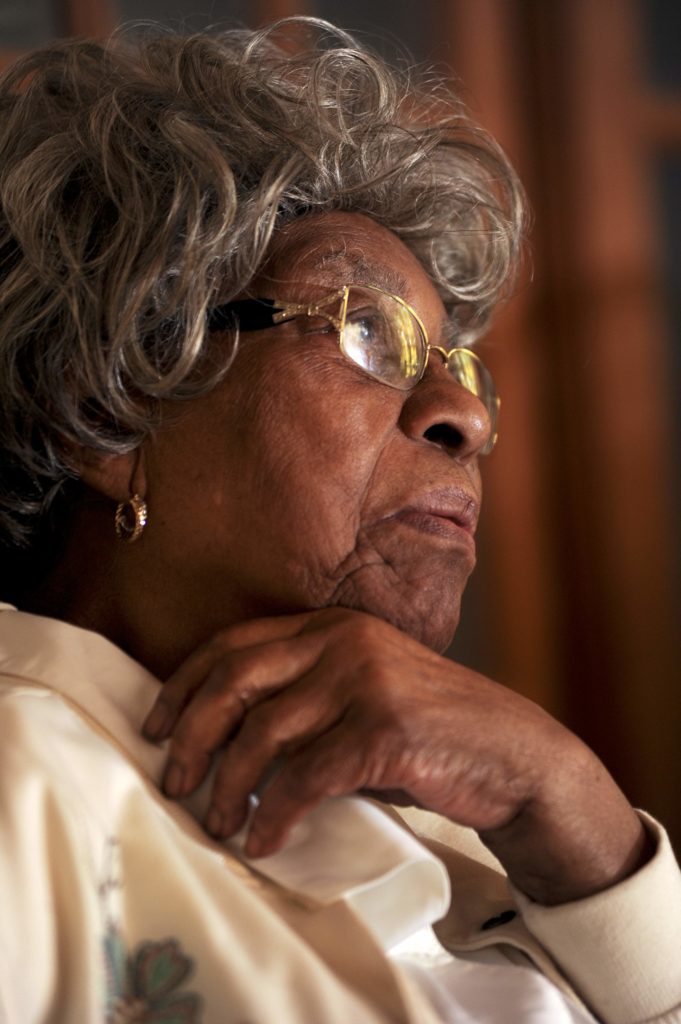
By Andrew Scott
Pocono Record

EAST STROUDSBURG, Pa. (AP) – It was 1936, a presidential election year.
In June of that year, while campaigning for his second consecutive term in office, President Franklin Roosevelt named Mary McLeod Bethune the director of the National Youth Administration’s Council of Negro Affairs, making her the first black woman to receive a presidential appointment and the highest-ranking black official in his administration.
This news wasn’t lost on many African-Americans including 21-year-old Christine Adams of North Carolina.
Like many other poor Southerners, Adams had married and started a family at a young age, 15 in her case. A former slave’s granddaughter, she supported her family by doing domestic work in white homes.
Adams’ seventh-grade education gave her a limited understanding of who the president of the United States was and what his duties were, as well as the identity and job of the black woman he had appointed.
What mattered was the date of Aug. 20, 1936. This happened to be just 11 days after Jesse Owens, a black man from Cleveland, Ohio, won four gold medals in track and field at the Olympics in Berlin, Germany, disproving Nazi dictator Adolf Hitler’s concept of racial inferiority and giving many Americans a sense of national pride.
The date marked Adams’ 22nd birthday, making this the first presidential election in which she was legally old enough to vote. And she wanted to vote for Roosevelt.
“He and his wife stood up for us black people,” said Adams, now 102, sitting in the living room of the Middle Smithfield Township home she has shared with her son, daughter and grandson for almost 23 years.
The 1936 election came 66 years after the passing of the Fifteenth Amendment, which banned federal and state governments from denying a citizen the right to vote based on race, color or previous condition of servitude. Yet, Adams and many other blacks in the South were denied the right to vote because they had no money to pay the poll tax.
This was one way of keeping blacks from the polls 30 years before civil rights legislation abolished such discriminatory practices. Other ways involved violence, terror and intimidation.
It wasn’t surprising, given the active racial segregation and inequality in a time when blacks accused of crimes were often lynched without being tried in courts of law to determine their guilt or innocence.
By age 11, Adams, had seen a black man almost burned alive and then beaten after being accused of stealing a soda.
While walking with friends one morning to the one-room schoolhouse where they were taught in those days, she saw another black man’s remains still lying on railroad tracks. Later, after her teacher told the children to forget what they had seen, she heard talk of whites having murdered the man.
“Those are two of the things I’ve seen that stay with me to this day,” Adams said in her southern drawl, slowly shaking her head.
Literacy requirement
In the period between both world wars, many southern blacks moved north for better opportunities.
By 1948, three years after Roosevelt’s death, Adams and her 11 children and second husband were living in a cold-water flat in Harlem, New York City. She was still doing domestic house work for whites to support the family, even more so after her husband’s death left her a single mother.
At the time, New York City had no poll tax, unlike southern states, but did require residents to take literacy tests to prove they were educated enough to vote. It would be another 17 years before the civil rights movement led to the passage of the Voting Rights Act prohibiting literacy tests and poll taxes as prerequisites to voting.
Adams didn’t wait that long. Since she had been unable to vote for Roosevelt, she was determined to vote in the 1948 presidential election for Harry Truman, Roosevelt’s former vice president who had succeeded him as president.
When the time came, she applied for, took and passed the literacy test.
“When I took the test, there was a lady sitting next to me who was struggling,” Adams said. “I tried to help her and (the person administering the test) came running over and said, ‘No, no, you can’t help her.”’
So, at age 34, Adams finally was able to vote for the first time. After helping elect Truman to his second consecutive term, she continued voting for Democratic presidential candidates throughout the 1950s and ‘60s as the civil rights movement came to national attention.
The youngest of Adams’ children came of age in Harlem during this time.
“We black children realized we could have dreams and pursue those dreams,” said Adams’ daughter, Rosa Cruz, 77, a retired social worker and nurse. “In Harlem, we had black business owners and people in professional occupations.”
Also, the Harlem Renaissance had given the black community a wealth of African-American art, literature, poetry and music expressing African-American culture, Cruz said. In addition, scholars like Carter G. Woodson and others had exposed the community to blacks’ historical contributions to America and the rest of the world.
“It all gave us a sense of pride and something to aspire toward,” said Cruz.
Prayers for presidents
Through it all, Adams served as her own role model to her children, passing down the values of discipline, humility, honesty and hard work her Christian upbringing had instilled in her.
“It was a time when we had a true sense of community,” said Cruz. “Some of our neighbors looked out for us when our mother was at work, so we knew someone was always watching when she wasn’t around. It was the same sense of community she herself experienced when growing up.”
The values Adams lives by have also been reflected by her choices of the candidates she has voted for in every presidential election since Truman’s time.
“I’ve always voted Democrat,” she said. “I voted for John Kennedy. He was another president who did all right for us.”
Like many other Americans, Adams and her family mourned Kennedy’s death and, later, the deaths of his brother, New York Sen. Robert Kennedy, and the Rev. Dr. Martin Luther King Jr.
“When we learned Dr. King had been murdered, I was at work,” Adams said. “I just broke down crying. The lady I worked for came to me and saw me in tears. She sent me home early that day. I even saw grown men crying like babies.”
Forty years after King’s murder, when Barack Obama ran for his first presidential term, “I was so happy to finally see a black man run and get elected, but at the same time I was scared they would murder him like they did President Kennedy and Dr. King,” Adams said. “I knew they would harass him. But, for eight years, I’ve prayed, ‘Lord, please don’t let them kill him.”’
Now planning to once again make it out to the polls in what will be the 18th consecutive presidential election in which she has voted, Adams laughs when asked whom she will vote for, as if saying her choice should be obvious.
“I think Hillary will make a good president,” she said. “I’ve lived long enough to vote for our first black president. If the Good Lord allows, I’ll still be around this Election Day to vote for our first woman president.
“I’m blessed to have seen the changes I’ve seen,” she said. “I think about the generations of my family I’ve lived to see grow up and have children and grandchildren of their own. I think how far we’ve come and how things have gotten better for each generation. I pray they keep getting better.”




